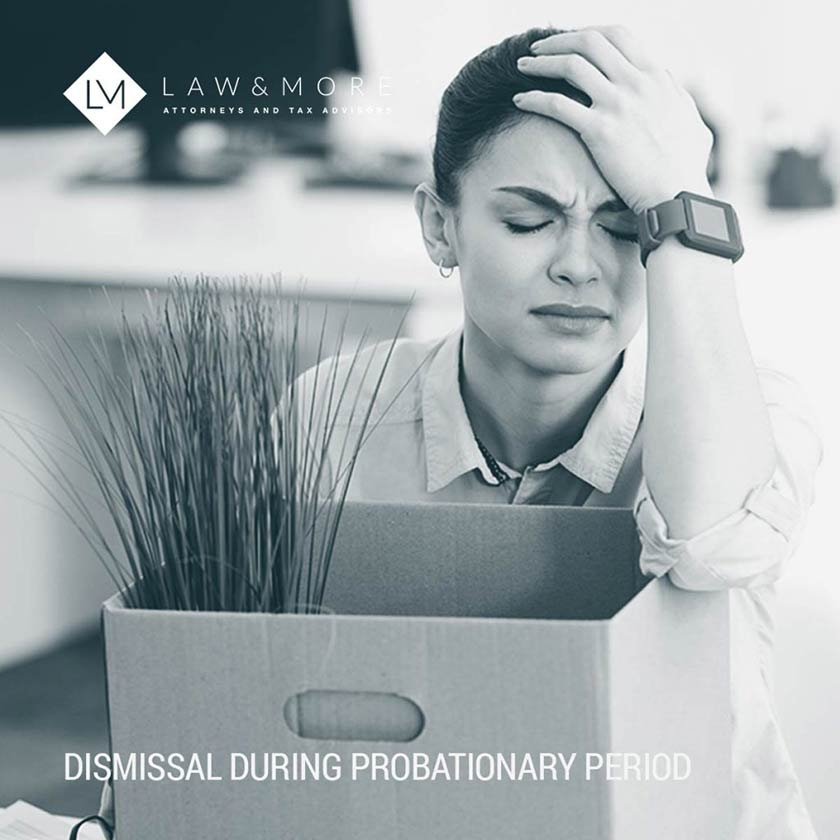During a probationary period, employer and employee can get to know each other. The employee can see if the work and company are to his or her liking, while the employer can see if the employee is suitable for the job. Unfortunately, this can lead to dismissal for the employee. Can the employer dismiss an employee for any reason within the probationary period? In this blog article we explain what to expect as an employee or employer. We will first discuss when a probationary period meets the legal requirements. Next, the rules regarding dismissal during the probationary period are discussed.
Legal probationary period
As different requirements apply to dismissals within the probationary period than to dismissals outside the probationary period, it is primarily relevant whether the probationary period meets the requirements of the law. Firstly, the probationary period must be the same for both parties. Secondly, the probationary period must be agreed in writing. This can be agreed, for example, in the (collective) labour agreement.
Length of probationary period
In addition, the probationary period must not be longer than legally permissible. This depends on the duration of the employment contract. For example, the law states that no probationary period may apply in the case of an employment contract of 6 months or less. If the employment contract has a duration of less than 1 year, but is longer than 6 months, a maximum of 1 month applies. If the contract is concluded for 2 years or longer (e.g. for an indefinite period of time), a maximum period of 2 months applies.
Probation period in a new employment contract with the same employer
It also appears from the law that a probationary period in a new employment contract with the same employer is in principle not allowed, unless the new employment contract clearly requires different skills or responsibilities. A new probationary period may not be included if the same work involves a successor employer (e.g. temporary employment). The consequence of this is that, by virtue of the law, a probationary period may, in principle, only be agreed on once.
Trial period does not meet legal requirements
If a probationary period does not meet the legal requirements (e.g. because it is longer than allowed), it is considered to be null and void. This means that the probationary period does not exist. This has consequences for the validity of a dismissal, because the regular legal rules on dismissal apply. This is subject to stricter requirements than dismissal during the probationary period.
Dismissal within the probationary period
If a probationary period does meet the legal requirements described above, a more flexible dismissal scheme applies. This means that the employment contract can be terminated at any time within the probationary period without a legally reasonable ground for dismissal. As a result, the employee may also be dismissed during the probationary period in the event of illness, for example, and is not entitled to a longer probationary period in this case. When terminating the employment contract, an oral statement is sufficient, although it is preferable to confirm this in writing.
Termination of the employment contract during the probationary period may be effected under these conditions for both the employee and the employer. This is also possible if the employee has not yet started his work. In the event of dismissal within the probationary period, the employer is not obliged to continue to pay wages and moreover (with the exception of compelling circumstances) is not obliged to pay damages.
Reason for dismissal
The employer is not obliged to give reasons when he or she terminates the employment contract. However, at the request of the employee, the employer must explain this. The same applies to the employee if the employer wants a motivation for the termination. The motivation for the dismissal must be provided in writing.
Entitlement to benefits
If an employee chooses to resign during the probationary period, he or she is not entitled to WW benefit. However, he or she may be entitled to a social assistance benefit from the municipality. If an employee is dismissed due to illness, he or she may be entitled to benefit under the Sickness Benefits Act (Ziektewet).
Discrimination
However, the employer is obliged to comply with the prohibition of discrimination when terminating the employment contract. Therefore, the employer may not terminate the contract in connection with gender (e.g. pregnancy), race, religion, orientation, disability or chronic illness. However, it is relevant here that termination within the probationary period during pregnancy or chronic illness is permitted in connection with a general dismissal reason.
If the dismissal is discriminatory, it can be annulled by the subdistrict court. This must be requested within two months after the dismissal. In order for such a request to be granted, there must be serious culpability on the part of the employer. If the court rules in favour of the employee, the employer owes the salary, as the notice of dismissal is considered invalid. The employer is not obliged to compensate the damage. Instead of annulment, it is also possible, in the event of discriminatory termination, to claim fair compensation in which case no serious reproach has to be proven.
Are you faced with a dismissal or intending to dismiss an employee during a probationary period? If so, please contact Law & More. Our lawyers are experts in the field of employment law and will be happy to provide you with legal advice or assistance during proceedings. Do you have any questions about our services or about dismissal? More information can also be found on our site: dismissal.site.
